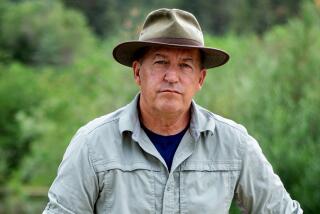For fun, not history, of the Old West
- Share via
Robert B. Parker’s “Appaloosa” doesn’t tell us much about the real Old West, but it offers a dryly amusing take on the Hollywood version. Elmore Leonard wrote westerns before finding his groove with contemporary crime stories; and Parker, best known for the Spenser mystery series and for completing “Poodle Springs,” begun by Raymond Chandler before his death, returns to the genre for the fun of it. Here he revels in “Yep. Nope.” dialogue and spare descriptions of frontier towns and arid landscapes and the gunfighters, storekeepers, painted women, hostile Kiowas and People Without a Past who inhabit them.
“Appaloosa” is narrated by Everett Hitch, a former cavalryman who found soldiering “crampsome” before he signed on as permanent deputy to Marshal Virgil Cole and began a 15-year career pacifying one hellhole after another. The two come to the copper-mining town of Appaloosa at the request of the leading citizens, who complain that rancher Randall Bragg -- who, lest we have any doubt he’s the villain, wears a black hat -- and his cowboys have been “living off us like coyotes live off a buffalo carcass.” They have stolen goods, raped women and, most recently, murdered the previous marshal and a deputy.
It’s the plot of “Seven Samurai” and “The Magnificent Seven” all over again, with the numbers whittled down and a few twists added. Cole pledges to enforce the law in Appaloosa -- provided he makes the laws himself. The townspeople agree, with misgivings. They sense correctly that Cole, as a professional gunman, has more in common with Bragg than with them. He’s a hero, all right, but he tends to beat people up when he gets irritated. And irritation aplenty soon arrives in the person of Allie French, who is pretty, neither a squaw nor a prostitute -- therefore a kind of woman Cole has never experienced -- and bent on lassoing herself the territory’s alpha male.
At first this seems to be Cole, who is unflappable when hot lead is about to fly. He starts building her a house. But later it seems to be Ring Shelton, head of an outlaw family Bragg hires to spring him from custody after Cole has gone to all the trouble of arresting him and holding him for trial. Still later it seems to be Bragg, who comes mysteriously into a fortune, gets a presidential pardon, declares himself a changed man, mounts a charm offensive, buys most of the businesses in Appaloosa and prepares to have Cole and Hitch fired.
“Appaloosa” is difficult to locate in history. Indians and buffalo are still around, but gunfighter culture appears to have existed forever. The town is somewhere vaguely east of the Rockies and north of Texas. It’s a stage set. Nobody who lives there has any connection with the outside world -- except for Hitch, who does have a past, a certain amount of education and the smarts to see beyond his sidekick role.
Hitch realizes that Cole is a born killer who needs to justify himself by sticking to the letter of the law. This rigidity allows Bragg to outmaneuver him. Hitch likens Cole’s relationship with Allie to that of a wild appaloosa stallion with his mares, compelled by instinct to fight off all challengers. Cole can’t step out of character. To help him, the easygoing Hitch must do so himself -- must confound our expectations and ride right off the set and into the sunset, in a conclusion that had to make Parker smile as much as his readers will.
Michael Harris is a regular contributor to Book Review.
More to Read
Sign up for our Book Club newsletter
Get the latest news, events and more from the Los Angeles Times Book Club, and help us get L.A. reading and talking.
You may occasionally receive promotional content from the Los Angeles Times.








